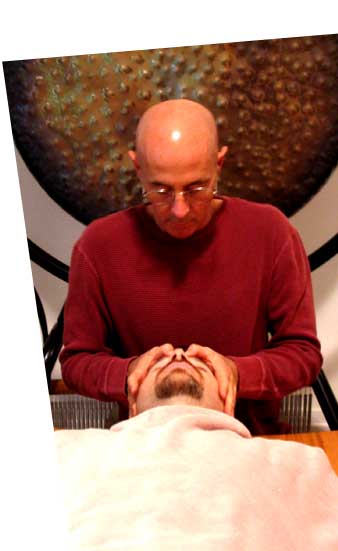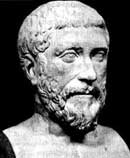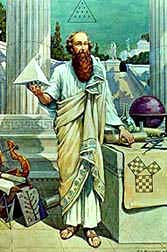

As soon as Pythagoras arrived in Kroton he aroused envy and suspicion in some sectors of society. As usually happens, a corrupt element eventually crept into the government and looked at the Pythagoreans as a threat to their growing dominance. A man named Kylon (wealthy and “noble” by birth) led this element. He continually attempted to enter the Pythagorean community and was continually denied. While Pythagoras was away from the region, Kylon gathered a large enough force of similarly motivated individuals and brutally murdered most of the Pythagoreans while banishing the rest.
Pythagoras (nearly 100 years old) took asylum in the Temple of the Muses where he was protected by sacred law from enemies. There he remained in meditation & decided to stop eating. On the fortieth day his body died of starvation.



|
About
Pythagoras
Pythagoras is credited with being the “Father of Mathematics”. He is also credited as being the “Father of Geometry” as well as the “Father of Music”. He discovered the musical intervals and taught that you could heal using sound and harmonic frequencies. He was the first person to prescribe music as medicine. He is considered the “Father of Harmonics”. He applied the principles of harmonics to everything from music, art and architecture to running governments, raising a family, friendship, and personal development. He is considered the “Father of Philosophy” in fact he was the first person to introduce the word, “Philosophy”. His Teachings, the “Golden Verses”, and his universal application of the “Golden Means” are a testament to his transcendent genius.  Pythagoras, like his contemporary The Buddha, (as E.M. Cornford puts it) was “one of those divine men of whom history knows least because their lives were at once transfigured into legend”. We can rely on a succession of credible scholars to substantiate that Pythagoras was born around 569 BC. (about 2575 years ago) on the island called Samos. He lived for nearly a hundred years. At a remarkably early age he exhibited an unparalleled “attraction to learning”. His father, Mnesarchus (an affluential merchant from Tyrs) insured that he received the best education conceivable. He not only studied with the preeminent scholars of his time; he rapidly surpassed them. This enlightened luminary matured into one of the greatest living Masters in history. He contributed important developments to the field of astronomy. Pythagoras was the first known Westerner to declare that the Earth was round. He argued that the Earth itself was a sphere and based this assertion upon his keen observations while looking at the curved shapes of the shadows cast upon the moon during an eclipse. Many of his theories were controversial in the West up until the time of Copernicus. (two thousand years later) Pythagoras demonstrated that day & night were the result of the Earth’s revolution. He explained that the moon is “bright” because it reflects light originating from the sun. He understood fully the nature of solar and lunar eclipses. He was the first to divide the Earth into five climactic zones ranging from the cold polar to the warmer equatorial regions. He taught that the change in the seasons was due to the tilt of the Earth’s axis relative to the sun. Pythagoras was the first to point out that the morning and evening stars were in fact the same planet- Venus. He loved inventing single words and images that would represent whole fields of knowledge. For instance: He was the first person to coin the word “Cosmos” which to gives reference not only to the entire universe but also imposes exact laws of harmony and order. Mentioned earlier, he was the first person to coin the word “Philosophy” which literally means, “love of wisdom” and refers to the study of the fundamental nature of knowledge, reality, and existence. (including all ideologies, theories, notions, doctrines, principles, tenets, viewpoints, and schools of thought).
 He is considered the major Founder of the Essene Movement. It is worth noting that the Essenes, during Christ’s time were known as “Jewish Pythagoreans”. (five hundred years later) ___________________________
In his lectures he taught gender equality which was unheard of in his culture. Pythagoras was the first person to allow women into the highest echelons of all Institutions. (governmental, spiritual, and scientific) |
Pythagoras was the first Greek be Initiated into the mysteries of the Egyptian Temples. (a task that took 23 years) He was the first “outsider” to develop fluency in the Egyptian language and written characters, to fully master all sciences from mathematics to medicine, from astronomy to architecture. At the same time, he was the only “outsider” to be admitted into the Secret Mystery Rituals including the Stages in Evolution of the Soul.
Before and after his quest for Initiation into the Mysteries of the Egyptian Temples, his contact with various cultures was profound and eclectic. He was of course, deeply influenced by the writings of Orpheus and familiar with the philosophical schools of Ionia. He studied from the priests that followed the Hebrew Sage, Moses. He was initiated into the mysteries of Byblos and Tyre. He was initiated into the Rights of Baal and Ashtara. He was also initiated into the cult of Morgos. He toured the oracles of the Greek world including Samothrace, Imbras, Eleusis, Thebes, and finally Delphi. (where his birth was predicted)
He settled into solitary hermitage on the slopes of Mt Carmel. Secluded in caves, near quite groves & clear springs he remained undisturbed in astute meditation. For centuries this area was known for sacred sites of oracle, mystical worship, and the prophesies of Elijah and Elisha.
Pythagoras approached different ideas and practices not as an outside observer but as a student of all form of knowledge that might guide him further in his search for understanding, wisdom and truth. He had perfect comprehension of the Principles of Ritual as they were applied to all religions of his time. His quest to combine all viewpoints without conflict was to be realized.
It is well documented that Pythagoras spent 23 years studying in the Egyptian Temples. First studying with the Priests along the Nile. Finally making it to the Temple at Thebes to applying to one of the foremost Centers that preserved all the scientific and spiritual knowledge throughout history.
Because Pythagoras was a “foreigner”, (Greek) the priests imposed extremely harsh disciplines thinking he would abandon his purpose and leave. After being assigned the complex programs of study, ascetic hardships, fasting, exhausting tasks & intense service to the temple, he performed every task so perfectly and so readily that he succeeded in winning the Elders respect and became the first Greek to be not only admitted but “Initiated” into the priesthood of the Diospolis Temple.
After 23 years of assimilating Egyptian scholarship, the King of Persia invaded and conquered Egypt. They executed the Pharaoh, captured Pythagoras and took him as prisoner to Babylon. However the Magi (the stewards of Persian science & religion at that time) were quick to recognize Pythagoras as an enlightened individual. Not to mention his prodigious ability to learn and his receptivity to exchange new and valuable ideas. He was allowed to absorb firsthand the wisdom of the Chaldeans. (the renowned astronomers and astrologers) He acquired knowledge from the Magians. (Academicians of Persia) He was introduced to the most prominent sages, savants and scholars throughout Syria… continuing to absorb, assimilate and synthesize.
This time was a momentous period in Persia’s culture. Only a century earlier had the reform movement emerged and monotheism, inspired by Zoroaster, challenged the system of multiple gods as well as the ridged social hierarchy in the Babylonian religion. He participated in elaborate purification ceremonies (including consumption of hallucinogenic Hoama-juice, sacred juice of the Parsees) and the Holy Fires of Ahura Mazda. It was at this time he perfected his knowledge of number, astronomy, harmony and the ability to predict the future with regard to celestial events.
Through music, Pythagoras performed what he called “soul-adjustments”
Music is Mathematics
Arithmetic= Number in itself
Geometry= Number in space
Music/Harmonies= Number in time
Astronomy= Number in space & time
Pythagoras used various intervals of harmonic ratios as a medicine for dis-eases of the body, the emotions, & the Soul. “He aligned Souls to their divine nature” and through music he performed what he called, “Soul Adjustments”. Pythagoras was able to discern the harmony and consonance of heavenly bodies, the “Music of the Spheres”.
Pythagoras put to use his discovery of mathematics as they relate to the harmonic ratios. He made stringed instruments that could be tuned so that they would consistently produce layered consonant musical intervals. Later Pythagoras calculated other chromatic and enharmonic orders, (using simple ratios to create complex intervals)
Pythagoras taught that music should never be approached simply as a form of entertainment. Rather, he recognized that music was an expression of “HARMONIA”, the Divine principle that brings order to chaos and discord. Thus music has a dual value because like mathematics, it enables men and women to see into the structures of nature.
Furthermore, he taught that if it was utilized correctly, music can:
a) bring the faculties of the Soul into harmony
b) compose and purify the mind
c) heal the physical body, thus restoring & maintaining perfect health.
One of his MOST IMPORTANT DISCOVERIES was that harmonic musical intervals could be expressed by perfect numerical ratios, a finding that led him to the realization that all sensible phenomena follow the pattern of number.
According to Iamblichus, “Pythagoras said the first important lesson to learn, is that which subsists through music…” for it “possesses remedies of human manners & passions that is able to restore pristine harmony and faculties of the soul”.
“Pythagoras devised (musical) medicines calculated to repress and cure diseases of both bodies and souls.
“For his disciples he arranged and adjusted what were called ‘Preparations’ and ‘Touchings’ which were a mingling certain diatonic, chromatic and enharmonic melodies, through which he easily turned the passions of the soul in a contrary a direction whenever they had been afflicted by sorrow, rage, pity, over-emulation, fear, manifold desires, angers, appetites, pride, collapse or spasms. Each of these were corrected by the rule of virtue, through appropriate melodies, as though some salutary medicine”
“At night when his disciples were retiring to sleep, Pythagoras would liberate them from the days perturbations, anxieties, and tumults, purifying their intellectual powers away from their corporeal nature, quieting their sleep and rendering their dreams pleasing and prophetic.”
“In the morning when they arose, he would free them from the night’s heaviness, coma, and torpor through peculiar chords and modulations”
“Pythagoras accomplished this by the employment of a certain indescribable divinity, difficult to apprehend, through which he extended his powers of hearing, fixing his intellect on the sublime symphonies of cosmos, he alone apparently hearing and grasping the universal harmonics and consonance of the spheres and stars, producing a melody fuller and more intense than anything effected by mortal souls.”
“This harmonic melody was the result of dissimilar and varying sounds, speeds, magnitudes and intervals arranged with reference to each other in a certain musical ratio producing a convoluted motion most musical and gentle.”
The more immediate, evident, and undeniable evidence of the influence of Number on our (mental, psychic, emotional) state is through the medium of music.
Pythagorean philosophy is a “purification”, the aim of which is the assimilation to God. The universe is divine because of its order (kosmos), harmonies and symmetries it contains and reflects. These principles make the universe divine for they are the characteristics of divinity and so they also innately subsist within the human soul. The Pythagoreans taught that the soul is a harmony. If we are to become like God, then according to Pythagorean philosophy the soul must become aware of its harmonic origin. According to Pythagoras… all harmony and order is the divine principle of number”.
For Pythagoreans the truth manifests itself through the world of physical phenomena; for example, he had no doubt that through experimentation on THE MONOCHORD one could experience THE DIVINE PRINCIPLES of HARMONY which underlie the structures of the cosmos.
Pythagoreans actually used certain forms of music to pacify and harmonize the mind as well as harmonize the irrational passions.
For Plato (a Pythagorean) mathematical studies were a preparation for the contemplation of divine principles. For Pythagoreans, mathematical studies ARE the contemplation of divine principles.
According to Iamblichus, “Through the proper use of music, diet, and exercise the early Pythagoreans sought to nurture and maintain the natural harmony of their body, mind, and soul.”
According to David Fideler, “HARMONIC PROPORTION… discovered by Pythagoras, exists as a purely universal principle, but it would never have been discovered without empirical experimentation on THE MONOCHORD”.Before he accepted anyone into the “Brotherhood” they were rigorously scrutinized and tested. His criterion was keenly stringent resulting only in extraordinarily brilliant and spiritually advanced adepts.
First Pythagoras asked about their relations with parents and family. He observed the tone in their speech and laughter. He inquired about their friendships and desires, activities during leisure, the nature of events that caused them joy or sadness. He observed their posture, gestures and movements. (regarding them as visible indications about the qualities of their soul) After this careful screening, if Pythagoras deemed an individual acceptable, they were able to join the community but only as an “Auditory” for a period of 3 years. This meant they could only listen to his discourses but they could not see him or engage in the dialogue.
During this period Pythagoras carefully observed their character & habits while noting their susceptibility to desires and passions including how they were affected by conflicts and disappointments. He tested their level of attachment to material things or their need for praise. He placed high value on generosity, reticence, and modesty.
After a survey of all these manners he directed his attention to their memory and their ability to learn. He allowed no one to write in order to exercise long term photographic memories. He evaluated their ability to follow what was said quickly and remember what was said accurately.
After the third year, those who were found unfit in any detail were required to leave the Community. Those who remained… advanced toward Discipleship. Because Pythagoras considered mastery over one’s tongue as the most difficult challenge, Auditors were required to observe strict silence for five years. All their possessions were given to the community and committed to trustees.
Finally after five years of silence, those who had won Pythagoras’ approval were Initiated as Disciples. The Initiates were divided into levels. Those at the highest level were called “Mathematicians”. These individuals were finally permitted to SEE Pythagoras during lectures for the “Inner Teachings”. Pythagoras lectured every evening. Rarely were there less than 600 attendees during nightly lectures.Pythagoras is perhaps best known to modern students of mathematics for his work in geometry, which he mastered during his 23 year stay as an Initiate in the Egyptian Temples. Every spring after the floods along the Nile River Valley, property lines would be obliterated. The Egyptians were forced to re-measure the land that they had cultivated for harvesting. They were compelled toward perfect geometry. (Indeed the word geometry means “earth measure”) Pythagoras made important contributions to this discipline. More profoundly, Pythagoras transformed geometry into a philosophical discipline which he called “historia” (or inquiry) “Figures as archetypes not figures for profit” was one of his favorite sayings. By this he meant that the purpose of studying geometry should be to turn the soul in the direction of higher aspects, not just to deal with sensory objects or material gain.
He was able for example to bring to perfection the theory of proportion, which became fundamental not only to the evolution of Western architecture and design but also to ethics and philosophy.
Contemplation of the tetraktys was used by the Pythagorean Brotherhood to merge with the Divine.